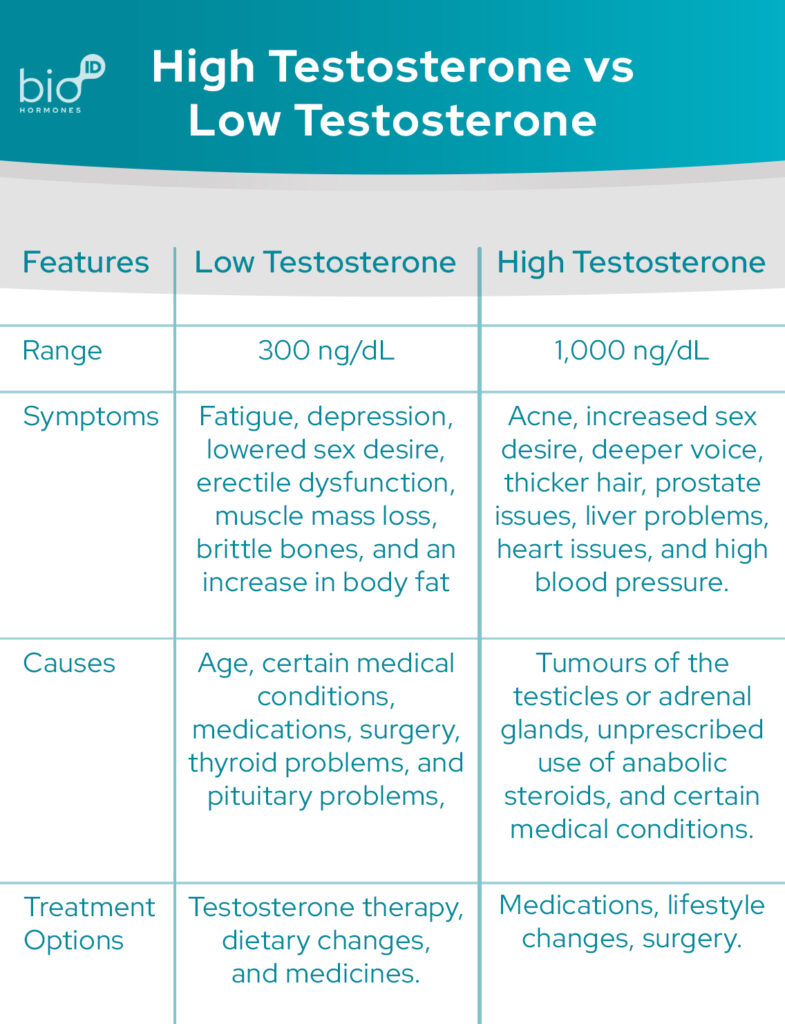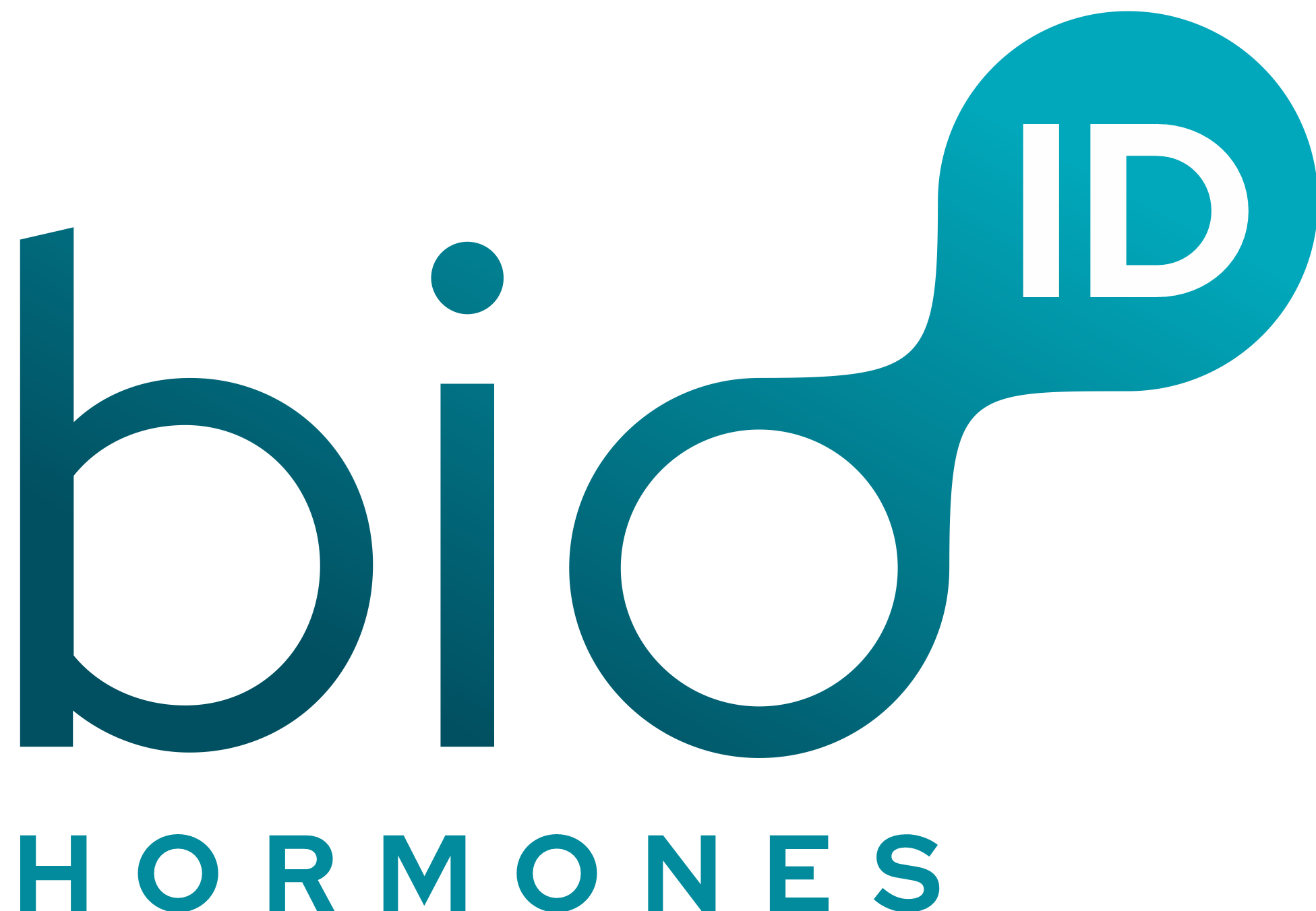Testosterone stands as a cornerstone of masculinity, but excess of it is not better for health. High testosterone can be caused by various factors and bring troublesome symptoms!
Testosterone, known as the “male hormone,” is key in determining men’s physical and emotional characteristics. But just like any other biological process, its balance is important. Our blog will assist you with valuable insights by highlighting the following points:
Table of Contents
We can empower males to navigate their health journey more effectively by discussing the causes, symptoms, and effects of elevated testosterone levels.
What is Testosterone?
it is present in both males and females, testosterone is most often linked to the development of men. It is produced mainly in the adrenal glands of females and the testes of males, and it is crucial for controlling bodily functions.
Testosterone encourages the growth of male reproductive tissues both during foetal development and puberty. It also contributes to bone density, voice depth, and adolescent muscle mass development.
Beyond physical changes, testosterone affects both genders’ libido, energy, and mood. So, it is essential to check its levels to maintain overall health.
Signs of High Testosterone in Men
When testosterone is produced in excess, it can affect men physically and emotionally in different ways. Let’s have a look at common signs that appear due to high testosterone levels:
Increased Muscle Mass
A spike in testosterone levels may cause a rapid increase in muscle mass, resulting in improved physical strength.
Hair Loss
Contrarily, high testosterone levels can make hair follicles smaller, resulting in early balding or hair thinning.
Aggressive Behaviour
Increased testosterone may increase some men’s aggression, irritability, and mood swings.
Increased Libido
A rise in testosterone is frequently accompanied by an increase in sex desire and an increased interest in sexual activities.
Sleep Disturbances
High testosterone levels may interfere with regular sleep cycles and make falling or staying asleep difficult.
Enlarged Prostate
Too much testosterone can sometimes enlarge the prostate gland, leading to urinary system issues.
Oily Skin and Sweat
High testosterone levels stimulate sebum production, producing oily skin and more sweat.
Fertility Challenges
Surprisingly, too much testosterone in men can suppress sperm production, which can end up in fertility problems.
Mood Swings
Varying testosterone levels can cause anxiety, depressive symptoms, and mood swings.
Note: It’s crucial to remember that while these symptoms can be linked to high testosterone levels, other factors may also impact them. Speaking with a healthcare professional is imperative for a precise diagnosis and successful management.
Related Article: Does Edging Work To Increase Testosterone?
What Causes High Testosterone In Men?
As a health care professional, high testosterone can be caused by various factors in the male’s body. Let’s have a look at the following leading causes:
Genetic Predisposition
It’s possible that some people’s bodies produce more testosterone due to a genetic predisposition.
Hormonal Imbalances
Disorders like PCOS and adrenal diseases can interfere with hormone production, raising testosterone levels.
Tumours
Testicular or adrenal tumours may overproduce testosterone, leading to hormonal imbalance.
Medications
Anabolic steroids and testosterone replacement therapy are two medications that can increase testosterone levels.
Lifestyle Factors
Inadequate sleep and intense exercise can temporarily raise testosterone levels. Chronic stress may also be involved.
Dietary Options
A diet high in processed sugars, unhealthy fats, and a lack of nutrients can lead to hormonal imbalances.
Obesity
Too much body fat can increase oestrogen levels, negatively impacting testosterone balance.
Age
Testosterone levels typically decline with advancing years, but in some cases, older men may experience a spike because of certain medical conditions.
Excessive Alcohol Consumption
Excessive alcohol consumption and drug abuse can interfere with the regulation of hormones, raising testosterone levels.
Environmental Factors
Exposure to endocrine-disrupting chemicals in the environment can hamper hormone production and regulation.
Note: Effective management depends on determining the root cause. If you think you may have high testosterone levels, you should speak with a doctor to determine the best course of action.
Is High Testosterone Good?
Although it is essential to maintain optimal levels of testosterone, the following is a list of possible advantages of high testosterone:
- Getting more rest and having deeper naps.
- Increased focus and energy, bone health and muscle mass.
- Decreased body fat.
- Less risk of prostate cancer and cardiovascular disease.
- Higher libido and greater sexual satisfaction.
- Reduce (or even eliminate) erectile dysfunction symptoms.
- Joint pain relief and a lower risk of osteoporosis.
- Lower cholesterol and reduced body inflammation.
Note: Balance is the key. The definition of ‘high’ can vary from person to person, and what is ideal for one person may not be suitable for another. If you suspect that you may have high testosterone levels, you must consult a healthcare professional.
High Testosterone VS Low Testosterone
Knowing the difference between low and high testosterone levels is essential to comprehend its symptoms, causes, and treatment options.
The following table can be helpful in grasping the difference between high and low testosterone levels:

Also Read: What are the Signs That You Need Hormone Replacement Therapy?
Final Remarks
Although testosterone is essential to masculinity, it’s crucial to understand that excessively high levels can cause various physical, emotional, and reproductive problems. Men can take control of their well-being when they are aware of the symptoms and causes.
If you recognise any of the symptoms mentioned, it is essential to seek medical advice. Understanding the underlying causes and implementing tailored solutions, with the help of healthcare professionals, can help you restore harmony to your hormonal balance, improving your general health and quality of life.
Are You Experiencing High Testosterone Levels? Consult BioID Professionals Today and Get Relived With Personalised Treatment Options!
FAQs
Is higher testosterone good?
Optimal testosterone levels benefit muscle growth, bone health, mood, and libido, but excessively high levels can lead to various health issues.
What does high testosterone do to a man?
A high testosterone level can increase aggression, irritability, oily skin, acne, and sleep apnea.
How to know if you have high testosterone?
Detect high testosterone through signs like acne, rapid muscle gain, mood swings, heightened libido, and disruptive sleep patterns.
What would cause a man’s testosterone to be high?
High testosterone in men can result from genetic predisposition, hormonal imbalances, tumours, certain medications, and lifestyle choices.
How do you fix high testosterone?
Treating high testosterone involves addressing underlying causes through lifestyle adjustments, medications, or hormonal therapy, under medical guidance.
What happens if a man has too high testosterone?
Excessively high testosterone in men can lead to issues like acne, aggressive behaviour, mood swings, sleep disturbances, and potential impact on fertility and cardiovascular health.
